Nature Heroes - Schools
Pennies Day Nursery
Northfleet Technology College
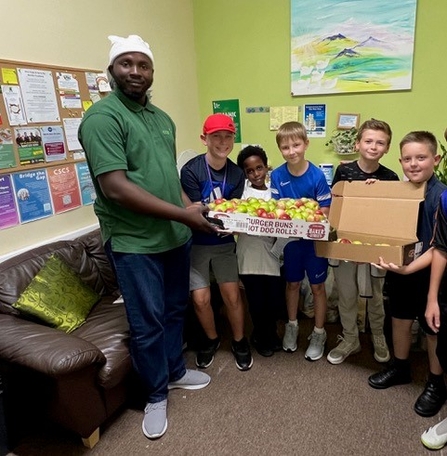
Who would have thought that our Nature Reserve would be considered an international model of good practice in sustainability and climate change? From our humble beginnings in 2021, asking the question “What lives here?” in relation to our two acre plot of land we have developed into a reserve.
With support from the Royal Society and Churchill Fellowship and advice form Canterbury Christ Church University, we were able to install a solar power unit to run a remote weather station and remote WIFI, equip a recycled container to collect rainwater, and purchase tools and equipment to plant and maintain the flora. To gather data on the fauna living on the Reserve, we installed eight wildlife cameras. This led to the development of a dedicated website to make others aware of our findings and progress.
Having a plan in place, supported by our student body, we were successful in acquiring over 1400 trees from the Tree Council and Woodland Trust. This provided us with the foundation for a hedge of over 100 metres, ensuring that food and shelter for a range of fauna will develop in the coming years. Amongst our trees are a selection of cherry and apple, which supplements our existing orchards. This serves two main purposes: a fresh fruit supply for our school community and local foodbanks (this year our Year 7 pupils harvested enough apples to donate 75 kgs). As the new trees integrate into the existing orchards, we will have a food supply for many years to come. What of the other purpose? An interesting fact we found out is that foxes really do like cherries! Putting aside clan differences, our cameras have captured two fox families in the same area making short work of windfalls. Of course, the apple trees have also provided a source of food for an amazing range of insects, birds and mammals.
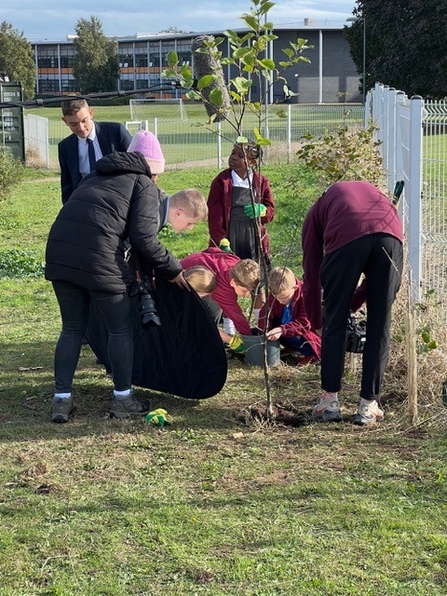
In September 2022 we were amazed to learn that our schools had been selected as finalists in the Zayed Sustainability Prize, an international competition. The UK falls into the Europe and Central Asia category, representing around 1/8 of the world’s population. NTC is one of three schools representing a massive land mass and population approaching 1 billion. In January 2023, Mr Jones (the manager of the Reserve) and two students were invited to the Abu Dhabi Sustainability Week conference. Unfortunately, we did not win but were proud to be invited to an event where world leaders and climate organisations met to discuss what they are doing for the planet. Whilst there, we met with the British Ambassador and Sir Ian Blatchford, Director of the Science Museum group.
Spurred on by our experiences, the student Eco Leader group set themselves up to develop the Reserve even more. We encouraged the school to install a dedicated learning centre and refurbish our pond. These are large undertakings which provide a real base to go forward.
Having planted over 1000 trees (with 400 more to come in December 2023), we quickly realised that we had accomplished three major goals: large scale carbon capture for decades to come, an air scrubbing system (trees taking in polluted air, removing particulates and expelling oxygen) and a source of food for pollinators.
In our journey, we have become increasingly involved with our local and wider community. In particular, the primary schools in our area use the Reserve to undertake their science education. More than that, they are using the Reserve to develop their climate awareness. In practical terms, this means that they get involved in planting and maintain our site. Through a plant one, get one scheme, primary pupils who help with planting our trees receive trees that they can plant back at their schools or homes.
Having a source of food for pollinators led us to install an apiary. We have two hives, both settling down for the winter. Bee colonies outgrow their hives. When this happens you have a choice, create a home for the new colony or let them go. Working with our primary schools, we have developed an ethical entrepreneurship partnership. When the colonies split, our primary partners will be given the colony and a beehive on our apiary. This will result in the apiary growing from 2 to 12 hives in the space of 2 years. The ‘entrepreneurship’ part comes in as beehives produce a valuable crop of honey, around 15-20 kgs a year. Schools using our site will be free to sell, swap or distribute the honey harvest using the proceeds to invest in sustainability projects. The apiary will receive a portion of this to help with the running of the area.
Each of our hives is equipped with a ‘hive heart’. This allows us to monitor the colony health. Data including temperature, humidity, sound frequency and amplitude is transmitted to a dedicated site. Powered by solar, this means that we can check if the hive sound is getting above 400Hz, which indicates that the bees are about to swarm. At around 280 Hz, your bees are telling each other where a good food source is. Being able to remotely monitor their hives means that our primaries can still have day-to-day involvement as well as working with their hives on the site.
All pupils involved with the bees will be encouraged to become qualified junior beekeepers meaning that they will learn about bee health and processing of honey and wax. Good job we have a dedicated learning centre on the Reserve!
Disappointed but not deterred by our Zayed Sustainability Prize result, we entered the competition again in summer 2023. Our focus was on energy and food. We are determined to power our learning centre with a small wind turbine, storing energy for days when the wind is low. The food aspect comes from the apiary. The model we have produced is transferable across the world and scalable. To our delight, we are one of three schools in our geographical area to be selected as finalists. As part of this, Mr Jones and two students have been invited to COP28 in Dubai for the last week of November and first week of December. On the 1st December, we were awarded winners of the Prize! Winning this means that we will be able to fund an education programme, secure our wind turbine and develop the Reserve further.
We welcome visitors – let us know if you want to experience what we are doing at jonesm@ntc.kent.sch.uk
What an incredible two year journey!
Oakley school
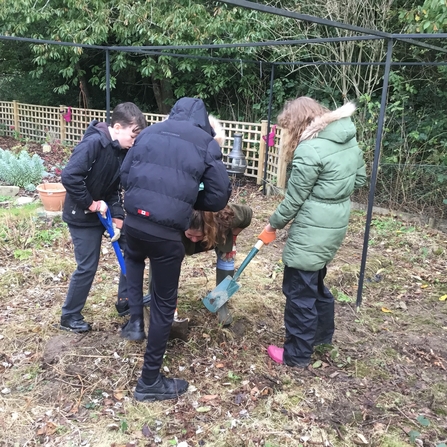
As a school we have been chosen to take part in the Historic Royals Palaces Superbloom Project run via the Tower of London.
This will allow us to continue developing our garden areas and there are strong links with Thrive: Using gardening to change lives. As part of this we have cleared an unused space of dying plants and weeds and are planning to create a garden that supports bees and butterflies and other insects.
We have already planted crocus and muscari bulbs as early feeders for bees and will continue with bee friendly planting in the spring. We will be asking for support from our families to create the new garden, involving them with digging over and hard landscaping as well as asking some of them to grow seeds at home for us.
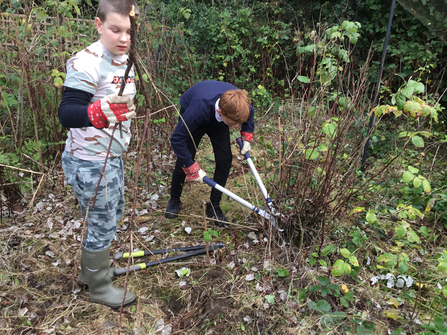
Pennies Day Nurseries
At Pennies, we look after children so if you asked about nature heroes in a classroom it’s quite likely those children would nominate their favourite animals, or perhaps some of the animals they see in their gardens or find on bug hunts! Pennies Day Nurseries is a local childcare company; we have been operating in Kent since 1999 and currently run three early years nurseries (one just over the border at Mark Cross in East Sussex which still serves Kent families), two kids clubs (before and after-school and holiday care to children aged five to 11) and we opened our first forest school on a site in the Kent Downs AONB in May 2023.
Early in 2020 the company took an active decision to put sustainability front and centre of our work, both in our activities with children and our dealings with the outside world. It’s put us on a challenging but hugely rewarding journey (including meeting and working with the Kent Wildlife Trust!) Some of the most vital lessons have been very simple. Small changes can have a big impact. The biggest positive in this has been the enthusiasm of children and staff when they set about regularly growing their own food (supported by composting and tending their vegetable patches in the nursery garden). We’ve also found local partners for small scale schemes designed as “win/win” projects in which we provide small sums of money and social media support to help the efforts of others that lack both of these. We’re now approaching our third year of working alongside Vinters Valley Nature Reserve and Detling Parish Council, each of which is partnered one of our Maidstone based settings, and our work has seen children visiting their green spaces, and the publication of leaflets we’ve given to parents and placed in a local shop to encourage children and families to explore these spaces in their own time. We’re still working to find new contacts but are now receiving contacts from others, including podcasters and other media which allows us to continue spreading our message: if every business with a small amount of spare money and a social media presence reached out to help local environmental initiatives, it would make a massive difference to the crises facing the environment.
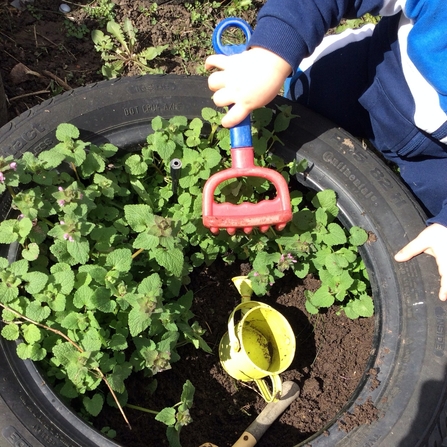
All the above has informed our new forest school, which operates as a pre-school with special “Toddler Tuesday” sessions. We’ve found the guidelines for good environmental practice set out by the Wilder Kent Awards and Eco-Schools Green Flag to be helpful in focussing our efforts and with the forest school we’ve had the chance to build this into the plans from the start. The aim is to get the new operation recognised by these awards in 2024, retain our standing in the same awards with our other settings and roll out simple but effective additions to our work. In the last case we are very conscious of the demands this puts on front-line staff who have nurseries to run but two schemes for 2024 appear to fit into our working model without greatly impacting anything else. We’re reviewing all our settings with the aim of ensuring that every sightline has some reminder of our commitment to sustainability. Much of this is already happening, our gardens have enough composting, growing, and feeding stations for animals to have achieved this but consistent reminders indoors will quietly make the point to parents and children. We’re also bringing in a scheme from early 2024 allowing all our staff, but especially those serving on our eco-committees in our various settings, to suggest their own initiatives to push forward this work. We’re anticipating some inventive ideas for classroom activities, maybe more links with local charities, but mainly we’re hoping for some good ideas that surprise us and take us forward in new directions.
Wellesley Haddon Dene
Wellesley Haddon Dene have entered The Wilder Kent Awards for two consecutive years, achieving a Bronze award in 2022 and a Silver award in 2023. The school has had a strong environmental message for most of its 150+ year history; being set in fabulous grounds, with many well established trees and an orchard has given us a unique asset. We have been lucky enough to have swifts nesting on the front of the school, hedgehogs and bats in the grounds and even a hobby nesting in one of our trees this year.
We are always looking for ways to help wildlife and being part of the Wilder Kent Awards scheme with Kent Wildlife Trust has given us a clear structure, and goals to aim for, on our journey to improve.
Having the whole school community behind our move to be a more sustainable and environmentally friendly school has made the journey so much easier. From our catering department thinking of great eco alternatives in the kitchen and our ‘fixit’ team building a forest school from recycled materials to a parent providing beehives and helping us to have a Honey Harvest day in the school, so many people have played a part in the story so far.
Our pupils are always keen to be helping wildlife and were thrilled when we managed to record a hedgehog and fox on our night camera. We have now set up a hedgehog highway, mapped our findings on The Big Hedgehog Map and even rescued a hedgehog found on our school grounds that was injured.
We are so lucky to have swifts in our local area (as a bird that has declined by over 50% in the past 20 years) and we have been logging our screaming parties flying over for a few years on Swift Mapper. We thought they must be nesting nearby (in fact they are on the front of the school) so we invited a local expert to give a talk to the pupils and held a fundraising event to buy some swift boxes to go onto our school.
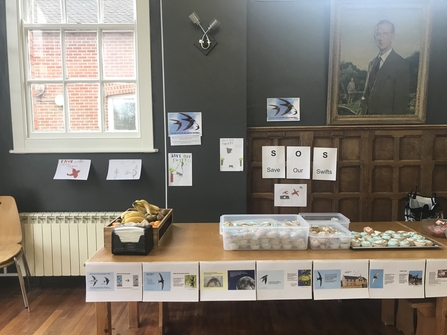
Like many people, we have been very concerned about the amount of plastic that is being thrown away or left on our streets so we joined the Great British Clean Up and went out and about (with one of our local councillors joining us) and collected over 40 bags of rubbish. We often do litter picks in our school grounds, too.
One of the popular activities in our Wild Club has been making pine cone bird feeders (using pine cones from our own trees and left over cheese from our kitchen). Most are taken home by the pupils but we also like to feed the birds in our school grounds. We take part in the RSPB Big Garden Birdwatch within the school grounds and have recently purchased new bird boxes (which we saw in use this year).
This year we decided to try to do an audit of what is living in our school grounds by participating in a BioBlitz. We feel that this has given us a better understanding of the wide variety we have and although our results may not be exact, the pupils loved hunting for different species.
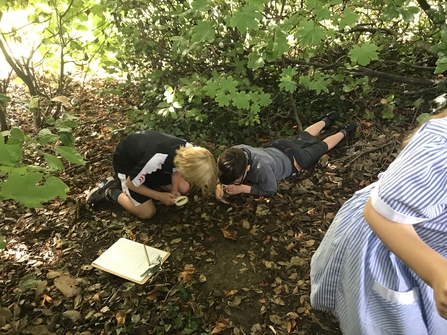
We enjoy helping the pupils to develop their green fingers and have done lots of planting and growing, including participating in the Grow Your Own Potatoes competition (using recycled containers) and it was great fun on harvesting day! We have also participated in No Mow May and Let it Bloom for June- watching our wildflowers grow in our orchard area.
There are so many great organisations that have free school resources so we never run out of things to do. Whether it is bug hunting, making a butterfly feeder, searching for fungi or bat monitoring, nature has a constantly changing list of activities provided.
Our pupils have formed an Eco Warrior group, whose job is to encourage other pupils (and staff!) to be more sustainable. They aim to reduce our carbon footprint and were proud to hear that our new school minibuses will be electric. We will continue to investigate how we can move towards a more sustainable future.
There is so much more that we can do and we have lots of great ideas that we have already picked up from other schools and organisations. We are hoping to ‘go for gold’ this year but more importantly we are hoping to encourage other schools in our area to join The Wilder Kent Awards - we all need to take action for nature, this is not something that can wait.
Holy Trinity and St John's CofE Primary School
AT HTSJ, we have a designated Woodland School site in our grounds which has been developed from scratch over the past three years. We consider this area to be the biggest and best classroom in the school and the children LOVE coming up and spending time in this little oasis of green which is tucked in amongst the urban heart of Margate. We also have an adjacent school garden which has been transformed from an unloved, over-grown space into an attractive and productive growing area.
Many of our children do not have access to an outdoor space at home. Our Woodland School enables them to develop a love for and a respect for nature, through daily up-close encounters and discoveries. Children from across the school can access the area daily with a Forest School Association trained primary school teacher. The impact of this on the children’s mental health and well-being has been dramatic.
We were fortunate to have a large number of mature trees on our site as well as many wildflower species and various types of fungi. We have planted many more trees, shrubs and plants over the past three years and now the environment supports wildlife such as invertebrates, birds, mammals and amphibians.
All of our wildlife sightings are recorded month by month, on a large board in our bespoke wooden den. This means that everyone in our school community can keep up to date with the variety of wildlife which has been seen. This information is also shared via the Woodland School blog on our school website. We also hold events in which parents are invited to come and join us for a session.
Both Woodland School and the school garden are totally organic as we do not use herbicides or pesticides on our site. In the spring we take part in “No Mow May” which allows our wildflowers to thrive. We make our own compost and we also make our own wildflower seed bombs (which we call seed poppers). It is brilliant fun to get muddy making them …and even more fun throwing them!
We are ‘off-grid’ and therefore only use rain water from our water-butts and small solar panels power the light inside the storage shed.
We have several bird baths, bird tables, hanging feeders, and feeding stations. Since these have been established we have seen a big increase both in the number of birds and the range of species visiting us. The children have been able to take part in bird watching every day if they wish and they are beginning to recognise our regular visitors! Some children can now also recognise some birds such as robin, wren, wood pigeon and crow, by their call. We have a range of identification guides on hand in our den and the children have been able to use these to help ID the birds, for example when they found a very striking turquoise feather they were able to establish that it was from a jay’s wing. We have installed nest boxes and the children have been able to watch, at close range, blue-tits flying in and out feeding their young each spring. The children have also seen a juvenile green woodpecker being fed by its parents in and around the sycamore trees.
The environment is also perfect for invertebrates and the children have seen many different species including stag beetles, privet hawk moths, harlequin and kidney-spot ladybirds, peacock and speckled wood butterflies, and shield bugs.
We have also installed bat boxes and a hedgehog house in our school garden. Although we haven’t yet seen any hedgehogs we know that they are around because we have found hedgehog poo! We have a fox den on site and some lucky children (and parents!) have seen the foxes and their cubs from time to time. We have seen house mice and wood mice in Woodland School, and we have a protected ‘mouse house’ area which is left undisturbed. Many grey squirrels have chosen to live on our site and we have several ancient holm oak trees which the squirrels use for both food and shelter. Squirrel spotting is a daily event but one which excites the children tremendously, especially with their acrobatic leaps from branch to branch!
The school garden has a small pond and we have an adjacent area for amphibians which includes clay pot ‘toad abodes’, both home-made and purchased. When pond dipping, we have found lots of pond snails and beetle larvae.
We hope that the future is bright for our special little space. We are planning to purchase and use a moth-trap so that the children can look at a greater variety of moth species and we would like to explore the idea of having a local beekeeper assess our garden to see if it might be possible to locate a hive within our site. We are going to set up two digital wildlife cameras and are hoping that they will capture some of our nocturnal friends!


